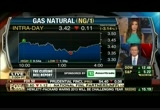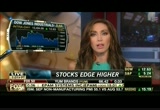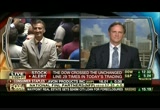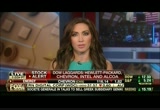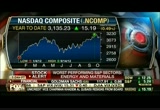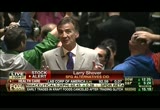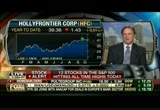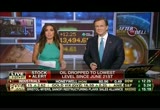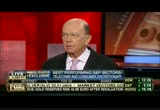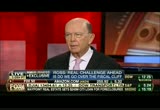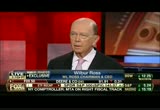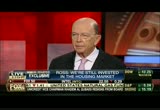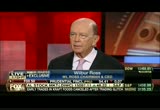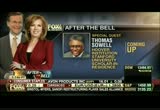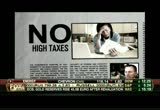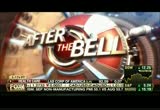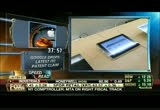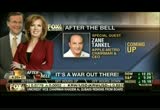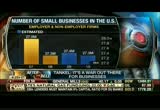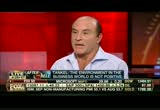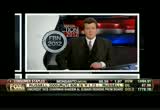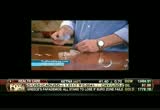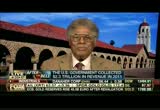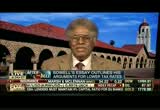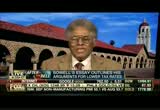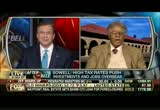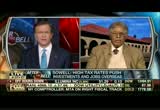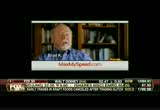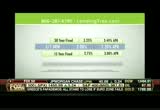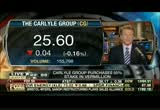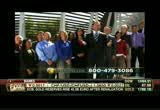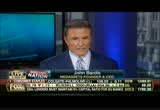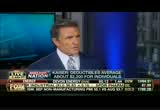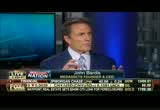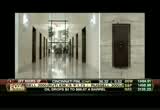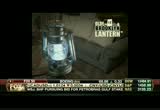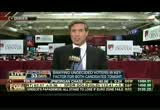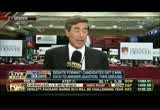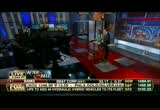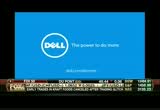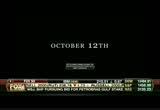tv FOX Business After the Bell FOX Business October 3, 2012 4:00pm-5:00pm EDT
4:00 pm
4.25%. oil stocks getting hit hard, right? >> they sure were. what is interesting oil dropping. transports are doing well. closing bell ringing] lauren: the bells are ringing on wall street. the end of wednesday's session. let's take a look how stocks are finishing up. the dow industrials higher by 11 points some well off the high of the session which was up 54 actually. the nasdaq hanging on up 15 points. zap up five points. russell 2000 down more than a point and a half. david: this is interesting. this is the small to mid-sized stocks. they took a little bit of a hit today. but oil, nothing like oil sinking. it was hit very hard. demand issue. demand, demand. this time it is concerns whether china will be growing, going to be buying more oil. again you can see it getting hit about 4.25% today. lauren: really bad for oil. it wasn't just oil that fell. nat-gas also tumbling down 4% nearly at one point.
4:01 pm
david: you have to put that into perspective of a gain of about, i don't know, 40%. wilbur ross will be able to tell us. he is dealing with natural gas over in china. kraft foods group was in the spotlight. some trades were ruled clearly erroneous, that in quotation marks and canceled after the stock surged about 29% in a minute. it was a minute burst and it didn't last. lauren: exciting 60 seconds. his investment strategy has been described as running into a burning building. he made billions by doing it. legendary investor wilbur ross is here. he will tell is what area he is actually starting to run away from right now. david: also one of america's greatest living economists tom sowell will join us with his take on the tax debate we'll hear about tonight. lauren: we'll tell you what drove the markets today with the data download. stocks edged higher on stronger than expected economic reports. all three major indices closing in the green but well off of session highs.
4:02 pm
eight of the 10 s&p sectors posting gains. telecom and consumer discretionary were the top performers today. we saw fallback in energy as well as materials. those lagged. the payroll services firm, adp, said the economy added 162,000 private sector jobs last month. that topped estimates of 143,000. now the august number, that was revised down by 12,000 to 189,000. of course we have to look ahead to the big government jobs report to flesh this all out on friday morning. the services sector that expanded at its fastest pace in six months in september boosted by a pickup in new orders. the institute for supply management nonmanufacturing index that looks at 18 services industries increased to 55.1 last month from 53.7 in august. david: all right. we've got all this covered plus a lot where we have larry shoafer in the pits of the cme group. bob phillips, telling us why
4:03 pm
the recession already here. legendary investor wilbur ross who needs no introduction and will tell us what is he investing. larry over at the i know talking with nicole that hewlett-packard was bringing down the whole index. you look at oil. it is hard, you can't call it a crash but a 4.25% drop in oil is the biggest drop we've had in months. doesn't that show you that we're at a tippingpoint here where the weakness in the economy may finally spill over to the stock market? >> it might be one of those things that does tip over the stock market. being down 4% i like the fact, i don't think the market likes that. we have lost steam. we made up some of that steam but being down 4% on the oil price, that might be something that leave as hangover tomorrow morning given all the moving parts saying we're really in contraction. it could be the start of a big downtrend in the market. lauren: talking about a downtrend, bob, you have a s&p target of 1250 right now,
4:04 pm
is that correct? >> that's right. lauren: go ahead, bob. >> yeah, for the end of the year. we're worried about is you look at the s&p so far this year and break it down in terms of earnings and earnings, the first quarter of this year grew about 7%. second quarter year-over-year is about two. expectations are for the third quarter to be actually down about a percent from last year. all of sudden the fourth quarter, about a 13, 14% increase over last year. then all of 13, 2013 we're expecting, analysts expect double-digit earning growth. and what stymies us is that if you look at sales growth since the december 2008 on average s&p share is about 16%. so where the growth comes from and sales to drive growth of earnings is really hard for us to discern at this point. david: it is pretty simple. without more sales you won't get profits. and without profits eventually you will get a down stock market. but you go beyond that. you think we're actually now
4:05 pm
in a recession, bob. if we're in a recession, when do we see the selloff? >> david, i think when momentum starts to brac in terms of, the market is moving up because of momentum from the price increases. so, a lot of that happened i think beginning with the anticipation of the fed doing qe3 and i think the first bought of bad news that comes causes a sell-off. we're in a traders market, not investors market. people that have money invested like a lot of our clients have don't want to go through another downturn ought to take advances we had and take the opportunity to protect some money. lauren: hey, larry, bring you back in here, we have the debates tonight. what we've seen is the market kind of just drift higher to the multiyear highs in many cases. is the market pricing in an obama win at this point? >> you know, unfortunately, sadly, yes. we're pricing in an obama victory right now. we're pricing in a senate
4:06 pm
victory. the congress will be kept by the republicans but yes, they are. it could be game changing tonight. high-risk theater. if romney comes out and forgets about bashing obama and starts talking about his plan, what he is going to do to create economic reform, lower, taxes, lower corporate welfare, i think that might be a game changer in the market but he has to do that tonight. david: all right. bob, despite the fact you think we're in a recession we are going to have a selloff as a result of that, you do have some stock picks. i was interested in one, holly frontier. it's a refining company. why if you think we're going into a recession would you be interested in refining if we're going to be cutting back on fuel? >> well i think, david, the key reason is, holly is currently trading quite cheaply, six times earnings. really gets back to where their refineries are positioned. they're in the middle part of the country. the rocky mountain area, the southwest part of the country. they're able to refine the heavy oils from the, coming out of canada and from the
4:07 pm
shale plays in the u.s. so we think they're perfectly positioned to use cheaper stocks of oil to produce, you know, gasoline and liquids that, puts them in a spot many, few others are in. lauren: hey, bob, you also like coca-cola. what is behind that? is that your typical emerging market play or something else you're looking at? >> well it is a combination of being defensive. you know, big company, incredible balance sheet, incredible brand. well-positioned in emerging markets. if you're looking having a stock to hold, coke pays you a nice dividend, close to 3% and we think it weathers any storm and there is growth for coke long term in the emerging markets. it is a great double play, defensive and growth. david: all right, guys, thank you very much. bob phillips. thank you. larry, we'll see you in a couple minutes with the s&p close. thanks, gentlemen. lauren: he made billions of dollars investing in industries that nobody wanted. after buying into the housing market at the worst
4:08 pm
possible time why is he now selling his real estate holdings?. david: because people are buying big-time. will lure l ross, joins us in a fox business exclusive. used to be american home mortgage. then homeward residential. we'll talk about that in a second but i'm intrigued by our first guests at least one of them believing we're in a recession now. do you believe that? >> well, i don't think it meets the technical definition of a recession because that is two consecutive quarters of down gdp. david: we had marti feldstein on earlier. he thinks the economy is bad but he used to decide whether we're in recession. he doesn't think we're there yet. >> he used to side whether to call it a recession. i don't think he decided whether we went into. david: no, i don't think anybody would decide to do that. lauren: it feels like we're in one, right? that's what matters. >> to the people surely out of work it surely feels like a recession. people struggling to get orders it feels like a recession. i don't think the technical
4:09 pm
issue matters. i think the real challenge ahead is do we go over the fiscal cliff january 1st? if we do, then for sure we're going to be in a recession. that will take 3 1/2% out of the gdp. that is a stroke of midnight. that is a big hit. we don't grow at 3 1/2%. so that clearly would put us in. lauren: the chief economist of the imf said today it will take 10 years to get out of this funk. that was just amazing. but you've been very clear about this, wilbur. saying that mitt romney is the guy to help the markets. why are you so bullish on mitt romney? >> well, for several reasons. one, we won't have a lot of the horrible things that the regulatory agencies are doing, the overregulation. that's a huge problem for business and for business confidence. lauren: right. >> second, there will be better supervision of things that need it. for example, a quarter of the people who exit unemployment do so to get
4:10 pm
disability benefits saying that they have mental disability. lauren: wow. >> mental disability. and they don't really investigate it. well, maybe they really are all mentally disabled but i'll be surprised if all of a sudden millions and millions of people have become mentally disabled. >> that will cost money to investigate it. >> the reason they go off the regular unemployment to get disability is simple. it pays more. david: let's go down to business here. your business in particular. homeward residential, you made $900 million out of the business since 2007. it was a great deal. you got in at an interesting time. you just sold it for total of 750 million in cash and stock. >> righters that's a nice chunk of change but does your getting out of this particular branch of the mortgage business mean that maybe the home market is not as solid as a lot of people think it is? >> well, not at all. it is just we've been in it for quite a while. as you know in private equity the only two good
4:11 pm
days the day you buy something and day you sell it. david: same with boats by the way. >> could be. these are easier to sell than boats. so, that was one thing. we've been in it for quite a while. our lps like realization. so that is --. david: what is your view of the housing market in general because you did have an inside look? >> we're still in it. we have a call one cmc. capital markets cooperative. we very recently bought a very large multifamily apartment house mortgage originator and mortgage servicer. we're not running away from the space. it is just that it's gotten to be such a big business and such a popular business, we decided we either had to be a major acquirer, go after gmac, things like that, or, fold in with someone else who was farther along. we're keeping a big stake in okay when. -- ocw the en.
4:12 pm
keeping $160 million of convertable preferred. we thought the market would accept the deal very well and like it. the stock ran up like mad today on the news. we're feeling pretty good about the referred part of the investment as well. we also think there is a very good corporate culture mix between the okay when guys and ourselves. ocwen. they live in west palm. i live in palm beach. i know herb by and his whole crowd and they're very good people. mortgage servicing is a scale business. this adds quite a lot to their scale. it will probably make it even more efficient operation than it was before. lauren: you go where no one else goes. where everybody else is scared, into the dark corners. where are you going right now? >> we haven't changed. we're in shale gas. we're in marine transport. we're into your even baines.
4:13 pm
-- european banks. those are the three big themes. david: i love the way you're in shale gas. china i thought united states had more natural gas in shale. it's china. one thing they don't have is the ability to tap into it. we have the technology. we have the know-how. we have the companies. correct me if i'm wrong you're putting two sides together, correct? >> that's what we're trying to do. they have a lot of very big acreage coming up for bid on the 26th of october. so we're trying to organize sino american consortium consisting of a big chinese company, big american natural gas people in order to, a, put a very good face into the auction, but b, in china there are only been 63 wells drilled for shale gas. so while we think they may have half again as much gas of the u.s., 63 wells is very small. david: that is tremendous potential.
4:14 pm
we put up the name of other u.s. drillers. would now be the time to invest in them because they could see the potential in china as well? >> i don't know. i don't know what each of them is doing. i don't think --. david: i'm wondering people out there how do they invest like wilbur ross in china? >> they don't want to take such reckless risks. david: suppose they do? >> i'm not aware of which of those guys may be there but what is the difference, only 63 wells in china of which only three were horizontal drilling and fracturing. over a million wells in the u.s. with horizontal drilling and fracturing, wow? >> so it can be made to work but it's not an easy thing. this is very complicated technology. and i think it's a very good way to have cooperation between china and the u.s.. lauren: and the u.s.. wilbur ross, thank you so much for all of your insight today. david: we've got a lot more coming including tom sowell
4:15 pm
straight ahead. stay with us [ male announcer ] what if you had thermal night-vision goggles, like in a special opsission? you'd spot movement, gather intelligence with minimal collateral damage. but rather than neutralizing enemies in their sleep, you'd be targeting stocks to trade. well, that's what trade architect's heat maps do. they make you a trading assassin. trade architect. td ameritrade's empowering web-based trading platform. trade commission-free for 60 days, and we'll throw in up to $600 when you open an account.
4:18 pm
david: s&p futures just closed. let's go back to larry at the cme group. larry, what does it look like for tomorrow? >> right now we have so many moving pieces in the market. consider bank of england, fomc, ecb, bank of japan and the romney debate coming up tonight. we have a lot of things going on the market held up quite well given all that. seems like everything is priced in. everything is status quo. we'll see. it could be a big game-changer especially tonight. >> larry shoafer at the cme. thanks, larry. lauren: let's go downtown to choke in with nicole petallides at the new york stock exchange. sherwin-williams hitting record highs once again today. >> that's right. it is a great stock to look at, hit a new record high this year. hear is the post for the trade. it was up almost 3% this year. this has been moving to the upside on the heels of the rise we've seen in existing
4:19 pm
home sales last month. that has given a boost to some of these housing-related stocks but sherwin-williams has been a great performer. year to date it is up almost 70%. some of the colors are lucky green, and gulf stream blue. as you know sherwin-williams can be for your home, for your car, for your boat and even your plane. lauren: nicole, if you only saw the colors on my walls, very interesting. not many of them because i live in manhattan. david: we don't have many walls in manhattan. lauren: good to see you. david: time for a quick speed read of some of the day's other headlines, five stories in a minute. first up, best buy ceo, richard schulze and four other firms doing due diligence the buy yacht plan may be up to $11 billion. world's largest chipmaker is hedging its bets on new areas such as cloud computing consumer internet and digital media.
4:20 pm
mobile mobility is withdrawing its claim against apple. the patent infringement claim was dropped without explanation. beer sales are rising first time in four years. recent study by the beer institute shipments rose nearly 2% to more than $141 million barrels in the first eight months of the year. new report apple is up pliers are starting to produce smallers version of the ipad. it will have a smaller screen with lower resolution. ed book man didn't really drink all the beer. i filling a little time because i did it quickly. that is today's speed read. buzz buzz. lauren: you did really well. drink kraft beer slowly and heavier and stronger. up 12%. david: i'm --. lauren: one businessman defied the recession finding opportunity amidst the rubble, opening ten new restaurants in four years. now he says it is a war out there for businesses.
4:21 pm
ben tangle joins us. david: he is one. world's most renowned and respecked columnists thomas sowell joins us with his take on taxes the debate and the election. that is coming up. ♪ ♪ [ male announcer ] how do you turn an entrepreneur's dream... ♪ into a scooter that talks to the cloud? ♪ or make 70,000 trades a second... ♪ reach one customer at a time? ♪ how do you help doctors turn billions of bytes of shared information... ♪ into a fifth anniversary of remission? ♪
4:22 pm
4:24 pm
lauren: welcome back. while many businesses shied away from expansion during the recession one business owner decided it was the perfect time to grow opening 10 restaurants since 2008. david: yeah but now he says there is a war out there for businesses or against businesses. zane tankel is chairman of apple metro. he owns 33 applebee's restaurants in the new york area. i think you're biggest in
4:25 pm
the area. >> not in the country. in new york. three by the way, david under construction as we stand here now. david: a lot of whether those things are finished depends who is elected president, right? you're putting a lot on this election. you voted for president obama in 2008. >> i did. i did. david: why are you not going to do it a second time? >> i wish i could answer that. that is an easy answer. i think he is declared a war, talk about war on businesses, class action, instead of incentivizing people to work and build businesses he is incentivizing people to not work and get paid not to work. why would you, why would you go to work when you can make as much or more by not working? he is created a division within the classes, or creating it. and, there is nothing positive, the environment, like the stock market, you have an environment that is positive. it goes up. so much is based on psychology. the environment in the business world is not positive. the environment that comes out of washington is all negative.
4:26 pm
and, i can't say we make decisions based upon tax codes. in our business, we're in a business of opportunity. i say we have three under construction because this environment creates opportunities. if you have some cash. landlords are willing to take a lesser rent if you will. employment is available because people aren't working. there are, out of the nonworking a bunch of that really do want to work and kacht find jobs. i can't say everybody that doesn't work wants to work. those opportunities present themselves we move forward. >> president will say he has cut taxes for small businesses. i what do you say to that? >> absolutely not. he can say whatever he wants to say. it is all very, patronizing the electorate. lauren: yeah. >> unfortunately this election on both sides very honestly there is a lot of credibility gaps. i would hope that both, both these candidates get on television and just be people and tell the truth and tell what the facts are but they're certainly not
4:27 pm
making the environment a positive environment for expansion or, we all know there is tons of money sitting on the sidelines. we all know that people aren't jumping in. we're expanding. we have a cap-ex budget now of $20 million. for a company our size that is a ton of money. lauren: yeah. >> but again, we're a business of opportunity. and because of this down environment we've had some opportunity since 07, 08 and in fact the three restaurants we're building right now are by far the most expensive restaurants we have ever built. there will be green restaurants. talk about, talk about incentivizing or disincentivizing, to get approved by the federal government for a green restaurant takes a whole year. lauren: i can only imagine. he is talking about opening these three restaurants but that is at least 300 jobs, right in real terms. >> yeah. the one we're opening next will be up in harlem on 117th street that will be 200 jobs. david: the single piece of legislation involves more taxation and more
4:28 pm
regulations than any others of course is obamacare, the new health care law. >> yeah. david: how are you planning, you're planning three new restaurants. how are you planning your payrolls? because a lot of your payroll will depend whether or not we have the full implementation of obamacare? >> that is a great question. we spent three hours on this last night. it is very opportune. the answer is we don't know. i can't believe he read 2700 pages. i'm given to no single individual read 2700 pages. so it's coming together. we're trying to plan for it. applebee's international has people on the ground full time in washington and they can't give us a direction. so how do you plan for it? that is the most difficult part for why business, i believe isn't moving forward because no one knows. no one knows what this is about. we can't put x value or y value on it and say what we project. we're working now on projections for next year, for 13. that's a big empty blank. lauren: i'm sick of that word, uncertainty. david: zane tankel.
4:29 pm
sorry you have to live with the uncertainty. >> thank you so much, david. david: thanks for coming in. president obama described mitt romney's economic plan as tax cuts for the rich and trickle-down economics. do these descriptions bear any resemblance to the truth? economist thomas sowell has been looking into this and joins us next to tell us where all this rhetoric came from. lauren: regulation nation, the founder of med assets is here to tell us why president obama's prescription won't fit what is really ailing this country's health care system.
4:32 pm
4:33 pm
where did it come from? famed economist thomas sowell has been looking into all this. he wrote an essay, trickle down theory and tax cuts for the rich published by hoover institution press and professor sowell joins us now. professor, always an honor to have you here. thanks for coming in. >> thanks for having me. david: so has any republican actually ever advocated something called trickle-down economics? >> neither a republican nor a democrat, nor member of any other group, nor any human being that i know of ever advocated that. david: so where does it come from? >> it comes from people who are opposed to tax cuts and who say that the people who want the tax cuts just want to give more money to the rich and in hopes their prosperity will trickle down. no one has ever said that. years ago in my column i challenged anyone to name any human being who had ever said it outside of an insane
4:34 pm
asylum? no one ever did. many people named someone said someone else said it but couldn't find the ultimate someone else said it. david: it is setting up a stray man. what it is doing playing into the notion the us versus them notion. they are rich, or that we are poor because they are rich and we will never get rich unless they brought down to our level, right? >> absolutely. the irony this, it is a recent thing. go back it time of say, around 19, 1920 democrats and republicans alike, secretaries of treasury in the wilson administration, the harding administration, the coolidge administration all said when tax rates are too high, you won't collect the money because people will go into tax shelters. they will buy tax-free municipal bond and so on. so you end up with less money than you would with a lower tax rate. based upon that argument tax rates were cut in the 1920s
4:35 pm
from a high of 73% to 24%. at 24%, the government collected far more revenue than they ever collected at 73%. i mean 73% of nothing does not bring in revenue. david: but the point is, is that the fact that when you lower tax rates the economy gets a charge and that increases economic activity and it increases actually government revenue as well because there is more tax dollars in it. that doesn't mean there is trickle down. that doesn't mean the rich giving little pieces of the pie to the poor, right? >> absolutely. the trickle down notion comes from people who have zero sum conception of the economy. every time one group gains some other group loses. they have no interest in what causes the economy to produce more rather than less. and the whole point of the tax cuts, both in the coolidge administration, the kennedy administration, reagan, bush, et cetera, is that people's behavior
4:36 pm
changes when you change the tax rates. and, in general. if you look at the a alleviation of poverty, that does not come about by exchanging shares of out put from different groups. it comes because the whole pie is bigger. not because they're fighting for a larger slice. you mentioned the kennedy administration. if in fact we hear from president obama accusing mitt pushing trickle down economic theory, the perhaps best thing he could do to quote john f. kennedy and clear and specific about supporting idea of lowering tax rates in order to increase economic activity. he said back until 1962 it is paradox cal truth the soundness way to raise revenues in the long run to cut tax rates now. the purpose of cutting taxes now is not to incur a budget deficit but to achieve a more prosperous expanding economy which can bring a budget surplus. could you have said it any
4:37 pm
better? >> no, i could not. the other thing kennedy said a rising tide lifts all boats. in other words he was getting away from the class warfare stuff. the class warfare thing makes a lot of sense politically but only politically. i don't think, obama knows this because he was asked this question back in 2008 and he understood sometimes you jack up the tax rate you get less and sometimes you bring it down and you get more but, his goal obviously is not to get more revenue for the government. it is to get more votes for himself by painting the republican as defenders of e rich while he is the champion of the middle class and the poor. david: well in 1980, as you well remember they tried the same thing against ronald reagan. in fact even some republican like george herbert walker bush called it voodoo economics this idea. the american public didn't like it. we like the notion of lower tax rates across the board for everybody. do you think they will buy it this time or do you think they will be suckered into the trickle down theory?
4:38 pm
>> i think it all depends on whether the republicans articulate. ronald reagan was certainly the most articulate of the republicans in the last 100 years. whether anybody else is going to get the same idea across, any other republican will get the same idea across to the public is something we may see some clue about tonight. david: economist thomas sowell, authored most recently you have a lot of books. hard to keep them in memory. trickle down theory and tax cuts for the rich. get it through the hoover institute press. thomas. thanks for coming in. appreciate it. >> thank you. lauren: thank you. more than 2,000 hospitals will be hit with thousands of dollars with fines and penalties under the health care reform law. the ceo of med assets is here. he will tell us how companies will be impacted and changes you, the patient can expect to see. plus we're just a few hours away from the first presidential debate later tonight. we're live in denver with a
4:41 pm
>> i'm robert gray with your fox business brief. applied materials says it will cut as many as 1300 jobs from its global workforce of the now the voluntary retirement program and realignment plans represents up to 9% of employees. murphy oil stock may see a more than 60% pop from its current levels. that is according to hedge fund manager daniel lobe who owns shares in murphy oil. in a letter to his hedge fund investors outlines the changes murphy could take to have happen. it is one of its largest position in its $9.3 billion portfolio. carlisle group is getting into the commodities
4:42 pm
4:43 pm
lauren: this week under a requirement of president obama's health care reform law hospitals will now face fines if they readmit too many medicare patients. david: this is just one of the many requirements hospitals are facing. joining us now is john bartis. he is medassets founder and ceo. john, you heard zane talking how he can't plan for payrolls because he doesn't know exactly how obamacare will work its way through the system. what about hospitals? how are hospitals preparing for the changes in the health care? >> well it is very challenging for them, david. in reality right now we're going to see somewhere around 20 million people
4:44 pm
enter the system, starting in 2014 to 2021. david: do you have the space for them? >> that is the biggest challenge but perhaps more serious challenge is what price will it have for the system. we believe medicaid, medicare rates which do not cover the actual cost of health care which is why private sector costs are so much higher. we see these influx of patients and putting pressure on hospitals financially on unit pricing basis that will invariably cause serious cost bumps for them. lauren: i can only imagine. we're not really describing what you really do. yes, you're a ceo but you work with four out of five hospitals across the nation. so you really have the pulse on this 2 1/2 trillion dollar sector of the economy. what does this mean for me when i go to the doctor? >> well it means you will have to know more than you do today. lauren: i don't pay attention to any of this stuff. i'm like most people out there. how is the health care law affecting patients? >> i think that is the key question.
4:45 pm
that is we've got a $15 trillion economy with almost $16 trillion in debt. $2.4 trillion and fastest growing segment is health care. grau 8.4%, four times gdp growth rate. no consumer knows how to buy health care or price it. if we're going to be successful and economy has 70% of the it based on consumers driving pricing and value we'll have to educate consumers how to buy it. today the wrong people pay for it and wrong people buy it. businesses pay for it, government pays for it and insurance companies buy it. we have no consumer engaged in the game to understand value. david: you know what milton friedman used to say? the best way to find a price for something take out the middleman. you have the service provider and service resee every, did receiver, those two make a deal. we have so many middlemen including much bigger government proehl than we ever had before. >> this was started by
4:46 pm
medicare in '65, incented every hospital or provider to establish their own costs for the very same procedures. david: how do we get better pricing into the system. >> we have to make it transparent. therefore for consumers to be engaged they have to know what they're buying. david: by the way, one anecdote. lawyer rein has hers. i have mine. my wife was in the hospital for quite a bit of time. she had 10 physical therapy sessions eeach one cost 150 bucks for the therapist. she was charged $27,000 for those 10 physical therapy sessions. i said my insurer will pay for it but i'm incensed by this. >> that's right, david. in fact the system which was established by the government hospitals really don't want to do this they're required to. they have to establish a list price in order to provide a rational discount to insurance companies. but this entire cost problem has been incented by the federal government since '65. we've been doing this same dance since '65 by increasing costs. federal government came back in '83 and capped the cost increases. that's when we saw the
4:47 pm
balloon squeeze out to the private sector. what today is unaffordable level. in fact encouraged the 30 million, 35 million people who needed insurance not to be able to buy it. this new program will bring in 20 million people by the year 2020 one but we're also putting hospitals under the gun by penalizing them for not delivering great outcomes or out comes we think we want the truth of the matter the hospitals had no responsibility for care of patients after they're discharged. really this is about not only value, it is about transparent pricing and norm sallization of a -- normalization of a market. we don't know how to value the same procedures across states because the prices are different starting with costs. lauren: we don't know anything? david: no, not in terms of pricing in medicine and the government doesn't seem to be making it any easier. john, you have your hands full, sir. thank you for coming in. >> thank you so much. david: we're hours away from the first presidential debate. we'll bring you live to denver coming next. lauren: plus jetblue is
4:48 pm
4:49 pm
on the company phone list that's a few names longer. you see us bank on busier highways. on once empty fields. everyday you see all the ways all of us at us bank are helping grow our economy. lending more so companies and communities can expand, grow stronger and get back to work. everyday you see all of us serving you, around the country, around the corner. us bank.
4:52 pm
david: in just a little over four hours president barack obama and challenger mitt romney will take to the stage for the first presidential debate of the 2012 election. lauren: peter barnes is live at the heart of the action in ben very. peter, both candidates want ear of undecided tonight. what will they be listening for? >> hey, lauren, very good. just in case you weren't sure about where we are, we are at the university of denver because the university is trying to be very low-key about all this and isn't trying to, you know, get any promotion from this or trying to, trying to maybe find new students or anything like that. it is very low-key, oh, anyway. listen, of course the big issue for both of these gentlemen, more so for governor romney is to get to these undecided voters, the
4:53 pm
president wants them to seal the deal. governor romney needs them badly according to the latest polls we've seen. today's "wall street journal" poll shows governor romney six points down. "wall street journal" poll, sorry, today's "wall street journal" poll shows him six points down. "fox news poll" shows him behind by eight points higher. so, kevin madden, governor romney's press person is saying the target for governor romney is the sliver of undecideds who he needs to come over to his side to get him back in the game and make sure he is competitive going into election day. what is the problem for governor romney? well, according to "the wall street journal" poll this morning, 40% of voters say that mitt romney does not have a message or they do not know what he would do if elected compared to 28% for president obama. so governor romney has his work cut out for him tonight. the campaign says he will be talking more about specifics and about specific issues here to try again, to convince those undecided
4:54 pm
voters, critical undecided voters to come over to the romney camp. lauren and david. back to you. david: peter, where are you again? i didn't get that? >> we are at --. david: oh that's right, okay. all right. i forgot. listen, hey, good for them. good for them. take advantage of the position you're in. that is good marketing. >> i shall not exploit for political purposes --. david: the identification of our sponsor. >> see you later tonight. lauren: peter, thank you. david: see you, peter. lauren: important piece of the jobs data tomorrow you can not afford to miss. it is tomorrow's trades today next. david: is it zagat? whatever it is. they made a huge blunder in their new 2013 san francisco guide. we'll tell you exactly what that is coming up. lauren: zagat ♪
4:56 pm
[ male announcer ] how do you turn an entrepreneur's dream... ♪ into a scooter that talks to the cloud? ♪ or make 70,000 trades a second... ♪ reach one customer at a time? ♪ how do you help doctors turn billions of bytes of shared information... ♪ into a fifth anniversary of remission? ♪ or turn 30-million artifacts... ♪ into a high-tech mastpiece? ♪ whatever your business challenge, dell has the technology and services to help you solve it.
4:58 pm
>> well you might be thinking of leaving the country if you're candidate doesn't win the presidential election. jetblue though, might be able to help you out a bit the airline will be giving away 2012 seats or 1006 round-trip flights for customers that pick the losing candidate in the election. travelers who visit jetblue.com can enter the election protection contest by picking their choice for president. isn't that nice? >> i guess we want to be a
4:59 pm
loser here. also "off the desk", maybe zagat should be getting the bad rating this time. the restaurant rating guide misspelled san francisco on first edition of 2013 san francisco guide. how did they spell it? i can't see. zagat says they're working to get versions off the shelves right away and new corrected versions will hit stores shortly. david: time for the top things to watch for tomorrow. number two, factory orders. factory orders in july did rebound almost 3% after they want down in june the good news isn't expected to last though. economists are expecting a drop of get this, 6%. we'll see whether that comes threw or not. >> you saw durable goods down last week 13% plus. david: awful. >> one other thing to watch the initial jobless claims, falling 26,000. the best single week decline since late july. will the trend continue? economists are expecting claims to rise to 370,000, up from
185 Views
IN COLLECTIONS
FOX Business Television Archive
Television Archive  Television Archive News Search Service
Television Archive News Search Service 
Uploaded by TV Archive on

 Live Music Archive
Live Music Archive Librivox Free Audio
Librivox Free Audio Metropolitan Museum
Metropolitan Museum Cleveland Museum of Art
Cleveland Museum of Art Internet Arcade
Internet Arcade Console Living Room
Console Living Room Books to Borrow
Books to Borrow Open Library
Open Library TV News
TV News Understanding 9/11
Understanding 9/11
